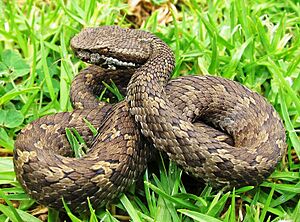Horseshoe pit viper facts for kids
Quick facts for kids Horseshoe pit viper |
|
|---|---|
 |
|
| Conservation status | |
| Scientific classification |
|
| Kingdom: | Animalia |
| Phylum: | Chordata |
| Class: | Reptilia |
| Order: | Squamata |
| Suborder: | Serpentes |
| Family: | Viperidae |
| Genus: | Craspedocephalus |
| Species: |
C. strigatus
|
| Binomial name | |
| Craspedocephalus strigatus Gray, 1842
|
|
| Script error: The function "autoWithCaption" does not exist. | |
| Synonyms | |
|
|
Script error: No such module "Check for conflicting parameters".
The horseshoe pit viper (scientific name: Craspedocephalus strigatus) is a type of venomous snake. It belongs to a group of snakes called pit vipers. This snake is special because it lives only in the Western Ghats mountains of India. It's known for a cool horseshoe-shaped mark on its neck!
Contents
Where Does This Snake Live?
The horseshoe pit viper lives only in the Western Ghats mountain range in India. You can find it in the states of Karnataka, Tamil Nadu, and Kerala. Specifically, it lives in the Upper Nilgiri Mountains.
This snake has one of the smallest living areas of all pit vipers in India. Some old reports mistakenly said it lived in other places.
What Kind of Home Does It Like?
The horseshoe pit viper likes to live in montane forests. These are forests found in mountains. It also lives in small patches of forest called sholas. You can also find it in grasslands.
These snakes live at high places, from about 1,100 to 2,400 meters (3,600 to 7,900 feet) above sea level.
How Does It Behave?
This snake mostly stays on the ground. People often see it on rocks or on the forest floor. It is probably active during the day. However, scientists don't know a lot about its daily life yet.
What Does It Eat?
The horseshoe pit viper is a predator. This means it hunts other animals for food. It likes to eat frogs. It also preys on smaller snakes and small rodents, like mice.
What Does It Look Like?
The horseshoe pit viper has some special features that help tell it apart from other pit vipers in India.
- It has small scales on its nose area.
- A specific scale on its upper lip touches a special pit on its face.
- It has 21 rows of scales around its body. These scales are mostly smooth.
- There is only one row of scales between its lip scales and its eye scales.
The snake gets its common name, "horseshoe pit viper," from a light-colored, U-shaped mark on the back of its neck. This mark looks like a horseshoe! The snake's back is usually light brownish or buff-colored. It also has darker grey spots and some white stripes.
Scientists have measured some of these snakes. On average, they are about 24.4 centimeters (9.6 inches) long from snout to vent (where the tail begins). Their tails are about 3.5 centimeters (1.4 inches) long. An average horseshoe pit viper weighs about 172 grams (6 ounces).
 | Laphonza Butler |
 | Daisy Bates |
 | Elizabeth Piper Ensley |


